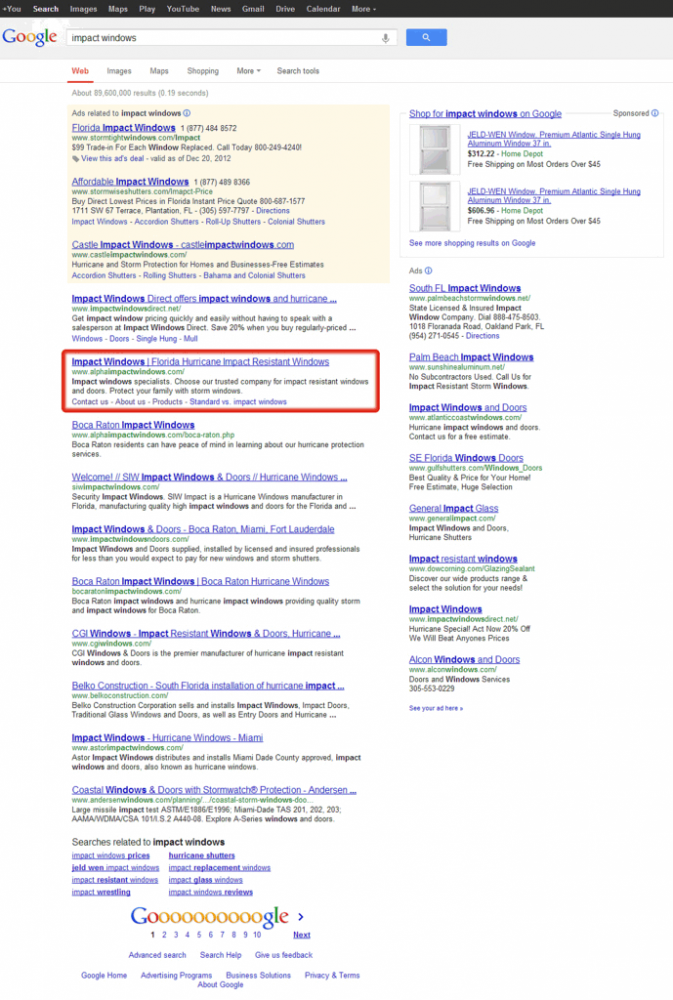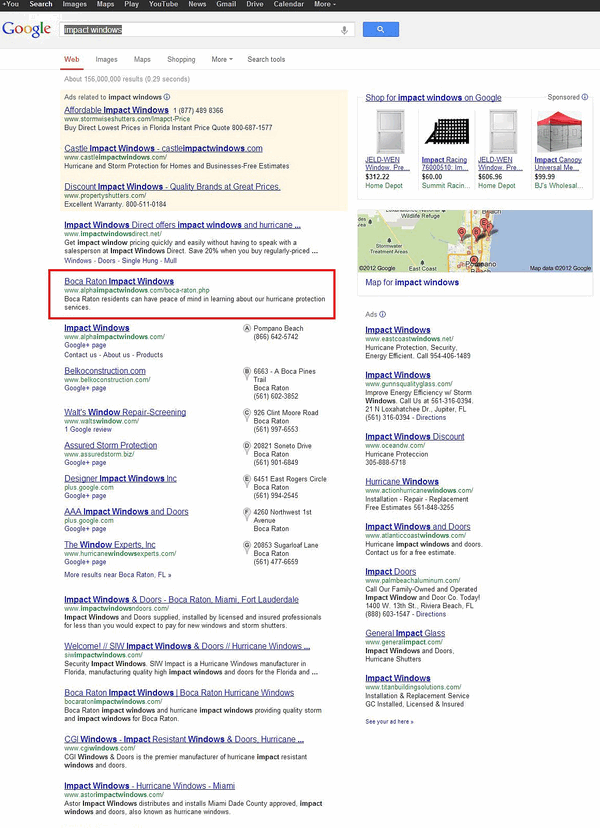
Is Your Website Being Replaced with Google Plus Local Listings?
It has been almost a year since Google replaced their business listing service, Google Places, in favor of Google+ Local as part of the search engine’s continuing efforts to increase the relevancy of their social media network, Google+.
Recall when Google Maps results started appearing above organic results? It caused a bit of controversy in the search world, but so long as the first page of Google was big enough for both local listings and traditional organic listings, it was all peace, love and harmony. However, based on some recent observations, we feel the situation may very well have progressed to a point where Google SERPs have been hijacked by Google+ Local listings, and now there can be only one.

I don’t know about you, but lately there has been a bit of a stirrup among some of our clients. Around the time of late December, 2012, a client started to report to us that they were no longer seeing their organic ranking for one of their broad, short tail (non-geo targeted) keywords on the first page of Google. This client’s homepage traditionally ranked in Google’s top 10 for the keyword, “impact windows,” as seen below (note that I always make sure that I'm signed out of my Google Account when checking SERPs and also have personalization disabled for good measure).
Sometime Before 12/21/12:
12/21/12:
The client was now telling us that they were only seeing their website on the third page, ranked via a seemingly arbitrary inner page. When we investigated Google SERPs, we were still seeing a standard organic result and also a Google+ Local listing on the first page. However, eventually, we also began to see that only the local listing showed up for us, and their homepage’s traditional organic ranking was nowhere to be found. Also, around this time, another client mentioned they were seeing a loss in top 10 rankings for some of their broad keywords including, “horseback riding tours.”
Looking at SERPs, sure enough, we saw them appear among the local listings:

But once again, when digging through SERPs, you could no longer find a standard organic ranking for their website’s homepage – now only the Google+ Local listing. Here is one more example:
This client has always ranked in the top 10 organically for “powder coatings.” It’s their bread and butter keyword. However, outside of their local listing, you’ll now be hard pressed to find them again in SERPs.
Let’s revisit the first client we mentioned. They were now unsatisfied. Although they were technically on the first page in Google for “impact windows,” they wanted to also remain as a standard, non-local organic result, as they observed that some of their competitors were still managing to do so. Reviewing SERPs, we were consistently seeing that competitors that ranked on the first page via a traditional organic listing for broad, short tail terms didn’t appear in the local listings and vice versa. Any website that showed up in the local listings could otherwise not be found in SERPs for the same page/keyword. Our client was doubtful that their local listing even counted as an organic ranking.
We decided to do an experiment. We called a colleague in New York City and asked them to search for “impact windows.” This is what they saw:
Sure enough, our client was appearing on the first page but not as a local listing (as they are Florida-based and not a local company in New York). My colleague appears to have been signed into her Google Account when checking this ranking for me, but her only tenuous association with this company is that she happens to knows someone (me) who works on this campaign. She's never visited the website before in her life. Google can't be that spookily omniscient with personalization, can they?
Still, we weren’t satisfied, because, after all, the client wasn’t satisfied. When reviewing their traffic in Google Analytics, we noted that their traffic had noticeably decreased around the end of 2012 and beginning of 2013 – the period when their organic listings were seemingly replaced by their Google+ Local listing.
Sure, aside from the possibility that Google+ Local listings were now cannibalizing organic rankings, there may have been other forces at work here. Perhaps a Google algorithm change may have been the culprit. Looking at the Google Algorithm Change History, we do in fact see a Panda "refresh" on December 21, 2012. This does happen to be the date we first noticed these SERPs shenanigans. However, if Panda's aim was to pick on "low quality" and "thin" websites, then they picked on the wrong ones. All of the websites we've mentioned here have a wealth of content. Also, why would only the homepage of these sites get Panda/Penguinated when inner pages still maintained their original rankings?
We decided to experiment with having the client’s Google+ Local profile link to an inner page of their website, as opposed to their homepage. Within two days, this was the result:

The client was now once again appearing as a standard organic listing and was ranking above the Google+ Local listings. Perhaps they really weren't Panda/Penguinated after all. We also notice that another broad keyword that they typically ranked well for, but had recently fallen off the map for, “replacement windows” was once again hovering around the first and second page of Google.
We aren’t yet seeing a difference in traffic in Google Analytics, but for this client, it may have been beneficial to keep them out of the local listings in SERPs -- only time will tell. Update (April 3, 2013): Precisely one month after this article was originally submitted (March 3, 2013), the client is still appearing separately (and positioned above) the Google+ Local Listings in SERPs for "impact windows."
Are you experiencing a similar phenomenon? Share your experiences with us and perhaps tell us what you are doing for your websites/clients if you have experienced this change.
This YouMoz entry was submitted by one of our community members. The author’s views are entirely their own (excluding an unlikely case of hypnosis) and may not reflect the views of Moz.








Comments
Please keep your comments TAGFEE by following the community etiquette
Comments are closed. Got a burning question? Head to our Q&A section to start a new conversation.